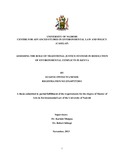| dc.description.abstract | The thesis details the traditional conflict resolution mechanisms and institutions among various traditional African communities and their relevance in Kenya today. It argues that these conflict resolution structures and institutions are rooted in the culture and history of African people, and are in one way or another unique to each community. The overriding legitimacy and resilience of traditional conflict resolution structures amongst these communities justifies an inquiry on how they can be adapted to resolve environmental conflicts under modern law.
The paper outlines the various types of environmental conflicts that obtain in Kenya today, the current methods of conflict resolution in use and their shortcomings. The research goes ahead to asses in line with Article 159(2) (C) of the Kenyan Constitution, Section 18 and 20 of the Environment and Land Court Act the role of traditional mechanisms in resolving environmental conflicts in Kenya.
The traditional methods discussed here are not novel; they have been with us from time immemorial only that they were not known with their current names. Examples include negotiation, mediation and the use of elders. The institutions of conflict management among the traditional communities include, the family, the extended family, the clan, the council of elders and the tribe
The paper critically examines these institutions and mechanisms in the context of making a case for the enhanced use of traditional conflict resolution mechanisms in conflict management today.
In conclusion the research focuses on some of the African countries that have adopted the traditional justice systems. Field survey was also conducted to find out the effectiveness of the legal and institutional framework for traditional justice systems, the applicability of the framework to resolution of environmental conflicts in Kenya and the reforms needed in order to enhance the use of traditional justice systems in resolution of environmental conflicts in Kenya | en |

